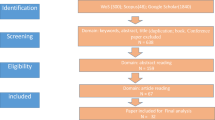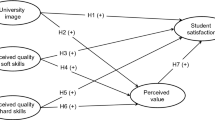Abstract
Student satisfaction gains an increasingly central position in the context of quality measurements. However, student satisfaction can also be stipulated as an important motivational factor for students as learners. This study combines this perspective on student satisfaction with the notion of differences in students’ ability. We hypothesize that differences in ability result in differences in student satisfaction. In line with concepts of high ability education, it is additionally hypothesized that this relation is mediated by educational stimulation—divided in cognitive, creative and professional stimulation—as well as by participation in honour programmes. A structural equation modelling (N = 733) of factors affecting student satisfaction in higher education shows that cognitive, creative and professional stimulation are the largest influencers of bachelor students’ sense of satisfaction. The interrelation between these three aspects of educational stimulation also shows the complexity of higher educational practice, since it suggests that cognitive stimulation cannot be realized without a creative factor, and vice versa. Professional stimulation needs both. Furthermore, the results show that educational stimulation mediates the effect of students’ ability on their educational satisfaction. This implies that changes in education can indeed influence students’ educational satisfaction, especially by providing educational quality. Finally, considering students’ ability level, it is shown that especially cognitively abler students are less easy to satisfy. The combination of educational stimulation and ability suggests that especially the more cognitively able students do not feel themselves sufficiently cognitively or creatively stimulated, and hence are less satisfied in vocational higher education.



Similar content being viewed by others
References
Alves, H., & Raposo, M. (2007). Conceptual model of student satisfaction in higher education. Total Quality Management & Business Excellence, 18(5), 571–588.
Busatoa, V. V., Prins, F. J., Elshout, J. J., & Hamakera, C. (2000). Intellectual ability, learning style, personality, achievement motivation and academic success of psychology students in higher education. Personality and Individual Differences, 29, 1057–1068.
Clark, M. H., & Schroth, C. A. (2010). Examining relationships between academic motivation and personality among college students. Learning and Individual Differences, 20, 19–24.
Dai, D. Y., & Chen, F. (2013). Three paradigms of gifted education: In search of conceptual clarity in research and practice. Gifted Child Quarterly, 57(3), 151–168.
Doppenberg, J. J., Griffioen, D. M. E., & Oostdam, R. J. (2016). Een typologie van excellentieprogramma’s voor het hoger beroepsonderwijs. Tijdschrift voor Hoger Onderwijs (3), 41–57.
Douglas, J. A., Douglas, A., McClelland, R. J., & Davies, J. (2015). Understanding student satisfaction and dissatisfaction: an interpretive study in the UK higher education context. Studies in Higher Education, 40(2), 29–349.
Duque, L. C. (2014). A framework for analysing higher education performance: students’ satisfaction, perceived learning outcomes, and dropout intentions. Total Quality Management & Business Excellence, 25(1), 1–21.
Duque, L. C., & Weeks, J. R. (2014). Towards a model and methodology for assessing student learning outcomes and satisfaction. Quality Assurance in Education, 18(2), 84–105.
Elliot, A. J., & Murayama, K. (2008). On the measurement of achievement goals: critique, illustration, and application. Journal of Educational Psychology, 100(3), 613–628.
Enthoven, M., Oostdam, R. J., Devilee, B., Winter, E., Doppenberg, J. J., & Griffioen, D. M. E. (2016). De betekenis en functie van een hogeschoolbreed intentioneel curriculum op de ontwikkeling van faculteitsspecifieke honoursprogramma’s. Tijdschrift voor Hoger Onderwijs (3), 22–40.
Epstein, R. M., & Hundert, E. M. (2002). Defining and Assessing Professional Competence. The Journal of the American Medical Association, 287(2), 226-235.
Floyd, D. L., & Holloway, A. (2006). Prioritizing service to the academically talented: the honors college. New Directions for Community Colleges (136), 34–52.
French, L. R., Walker, C. L., & Shore, B. M. (2011). Do gifted students really prefer to work alone? Roeper Review, 33(3), 145–159.
Furtwengler, S. R. (2013). Goal orientation does not predict student participation in a community college honors program. San Antonio: Paper presented at the Southwest Educational Research Association.
Furtwengler, S. R. (2014). Does achievement goal orientation predict participation in a post-secondary honors program. Porto: Paper presented at the European Conference for Educational Research.
Gradreau, P. (2012). Goal self-concordance moderates the relationship between achievement goals and indicators of academic adjustment. Learning and Individual Differences, 22(6), 827–832.
Griffioen, D. M. E., Doppenberg, J. J., Enthoven, M., & Oostdam, R. J. (2016). Ontwerp, gebruik en acceptatie van excellentie in de hogeschool van amsterdam. De evaluatie van excellentieprogramma’s onder sirius. Retrieved from Amsterdam:
Guppen, H. (2015). Jongeren mogen best iets lager mikken, vindt Bussemaker. HOP.
Hazrati-Viaria, A., Rada, A. T., & Torabib, S. S. (2012). The effect of personality traits on academic performance: the mediating role of academic motivation. Procedia - Social and Behavioral Sciences, 32, 367–371.
James, L. T., & Casidy, R. (2016). Authentic assessment in business education: its effects on student satisfaction and promoting behaviour. Studies in higher education.
Kiley, M., Moyes, T., & Clayton, P. (2009). ‘To develop research skills’: honours programmes for the changing research agenda in Australian universities. Innovation in Education and Teaching International, 46(1), 15–25.
Kline, R. B. (2011). Principles and practise of structural equation modeling (3rd ed.). New York: The Guiford Press.
Koerhuis, M. J., & Oostdam, R. (2014). Ongewenst gedrag van VMBO-leerlingen in relatie tot hun behoefte aanautonomie, competentie en sociale relaties. Tijdschrift voor Orthopedagogiek, 53(3), 117-130.
Komarraju, M., Karau, S. J., & Schmeck, R. R. (2009). Role of the Big Five personality traits in predicting college students’ academic motivation and achievement. Learning and Individual Differences, 19, 47–52.
Kyndt, E., Dochy, F., Struyven, K., & Cascallar, E. (2011). The perception of workload and task complexity and its influence on students’ approaches to learning: a study in higher education. European Journal for Psychology in Education, 26, 393–415.
Loyens, S. M. M., Rikers, R. M. J. P., & Schmidt, H. G. (2007). The impact of students’ conceptions of constructivist assumptions on academic achievement and drop-out. Studies in Higher Education, 32(5), 581–602.
Mai, L.-W. (2005). A comparative study between UK and US: the student satisfaction in higher education and its influential factors. Journal of Marketing Management, 21(7–8), 859–878.
Mark, E. (2013). Student satisfaction and the customer focus in higher education. Journal of Higher Education Policy and Management, 35(1), 2–10.
Marra, R., & Palmer, B. (2004). Encouraging intellectual growth: senior college student profiles. Journal of Adult Development, 11(2), 111–122.
Muthén, L. K., & Muthén, B. O. (2007). Mplus users guide (5th ed.). Los Angeles: CA: Muthén & Muthén.
Niemiec, C. P., & Ryan, R. M. (2009). Autonomy, competence, and relatedness in the classroom. Applying self-determination theory to educational practice. Theory and Research in Education, 7(2), 133–144.
Plucker, J. A., & Callahan, C. M. (2014). Research on giftedness and gifed education: status of the field and considerations for the future. Exceptional Children, 80(4), 390–406.
Pullen, A. G., Griffioen, D. M. E., Schoonenboom, J. I., de Koning, B. B., & Beishuizen, J. J. (2017). Does excellence matter? The influence of potential for excellence on students’ motivation for specific collaborative tasks. Studies in higher education, 1–13. doi: http://dx.doi.org/10.1080/03075079.2017.1304376
Reis, S. M., & Renzulli, J. S. (2010). Is there still a need for gifted education? An examination of current research. Learning and Individual Differences, 20, 308–317.
Renzulli, J. S. (2011a). Reexamining the role of gifted education and talent development for the 21st century: a four part theoretical approach. Gifted Child Quarterly, 56(3), 150–159.
Renzulli, J. S. (2011b). What makes giftedness? Reexamining a definition. Phi Delta Kappan, 92, 81–88.
Rogers, K. B. (2007). Lessons learned about educating the gifted and talented: a synthesis of the research on educational practice. Gifted Child Quarterly, 51, 382–396.
Rotgans, J. I., & Schmidt, H. G. (2011). Situational interest and academic achievement in the active-learning classroom. Learning and Instruction, 21, 58–67.
Sarrico, C. S., & Rosa, M. J. (2014). Student satisfaction with Portuguese higher education institutions: the view of different types of students. Tertiary Education and Management, 20(2), 165–178.
Scager, K. (2013). Hitting the high notes. Challenge in teaching honors students. (Ph.D), Universiteit Utrecht, Utrecht.
Scager, K., Akkerman, S. F., Pilot, A., & Wubbels, T. (2014). Challenging high ability students. Studies in Higher Education, 39(4), 659–679.
Seveke, R. (2015). Ons onderwijs draait te veel om status, positie en diploma. De Volkskrant. Retrieved from http://www.volkskrant.nl/opinie/−ons-onderwijs-draait-te-veel-om-status-positie-en-diploma~a4077277/
Spooren, P., Mortelmans, D., & Denekens, J. (2007). Student evaluation of teaching quality in higher education: development of an instrument based on 10 Likert-scales. Assessment & Evaluation in Higher Education, 32(6), 667–679.
Spooren, P., Brockx, B., & Mortelmans, D. (2013). On the validity of student evaluation of teaching: the state of the art. Review of Educational Research, 83(4), 598–642.
Subotnik, R. F., Olszewski-Kubilius, P., & Worrell, F. C. (2011). Rethinking giftedness and gifted education: a proposed direction forward based on psychological science. Psychological Science in the Public Interest, 12(1), 3–54.
Uttl, B., White, C. A., & Gonzalez, D. W. (2016). Meta-analysis of faculty’s teaching effectiveness: student evaluation of teaching ratings and student learning are not related. Studies in Educational Evaluation. doi:http://dx.doi.org/10.1016/j.stueduc.2016.08.007
Wolfensberger, M. V. C. (2012). Teaching for excellence. Honors pedagogies revealed. (Ph.D), Universiteit Utrecht, Munster.
Xiao, J., & Wilkins, S. (2015). The effects of lecturer commitment on student perceptions of teaching quality and student satisfaction in Chinese higher education. Journal of Higher Education Policy and Management, 37(1), 98–110.
Ziegler, A., Stoeger, H., & Vialle, W. (2012). Giftedness and gifted education: the need for a paradigm change. Gifted Child Quarterly, 56(4), 194–197.
Author information
Authors and Affiliations
Corresponding author
Appendix
Appendix
Rights and permissions
About this article
Cite this article
Griffioen, D.M.E., Doppenberg, J.J. & Oostdam, R.J. Are more able students in higher education less easy to satisfy?. High Educ 75, 891–907 (2018). https://doi.org/10.1007/s10734-017-0176-3
Published:
Issue Date:
DOI: https://doi.org/10.1007/s10734-017-0176-3




